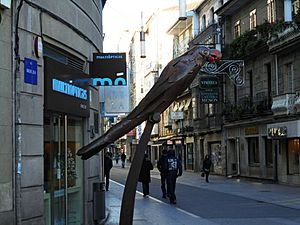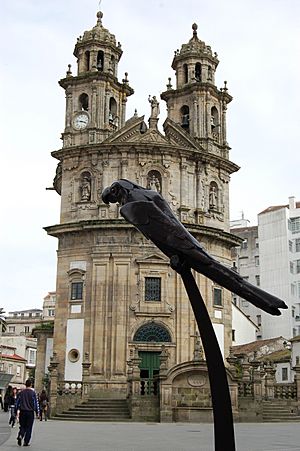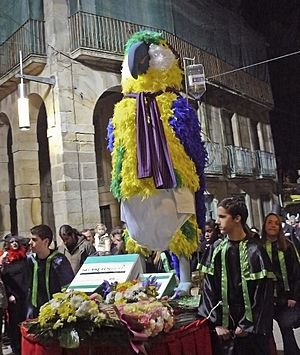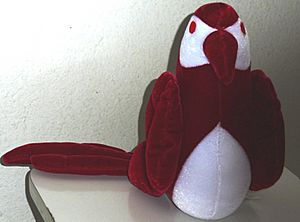Ravachol Parrot facts for kids
The Ravachol parrot lived in Pontevedra, Spain, between 1891 and 1913. It was the pet of a pharmacist named Perfecto Feijoo. This special parrot became one of the most famous symbols of the city.
Every year, people in Pontevedra remember the Ravachol Parrot's burial during the city's fun carnival celebrations.

Ravachol Parrot statue
|
|
| Species | Parrot |
|---|---|
| Died | 26 January 1913 Pontevedra, Spain |
| Resting place | Mourente, Pontevedra |
| Occupation | Pharmacist's pet |
| Years active | 22 |
| Known for | Intelligent and sarcastic conversation |
| Owner | D. Perfecto Feijoo |
| Residence | Pontevedra |
| Named after | François Ravachol |
Contents
Why Was the Parrot Named Ravachol?
The parrot didn't have a specific name when it first arrived in Pontevedra. But soon, everyone knew it by the name of a famous French revolutionary. This person, François Ravachol, was an anarchist. This means he believed in a society without government. He was known for causing trouble.
The parrot's owner, Don Perfecto Feijoo, gave it the name Ravachol. He did this because the parrot was very wild and hard to control, just like the famous revolutionary.
The Parrot's Story
Who Was the Owner?
Perfecto Feijoo (1858-1935) was a pharmacist from Pontevedra. He studied at the University of Santiago de Compostela. From 1880, he ran his pharmacy. It was located in the Plaza de la Peregrina, near the Church of the Pilgrim Virgin.
Perfecto Feijoo was a friendly person. Many important people from Pontevedra would gather at his pharmacy. They included politicians, artists, and scientists. They came to have lively discussions. He was a very popular person in Galicia at that time.
Where Did the Parrot Come From?
The exact birth date of the Ravachol Parrot is not known. However, in 1891, a friend of Don Perfecto, Martin Fayes, gave him the young parrot. Martin Fayes was a music teacher.
Some people say that the parrot's ancestors came from America. In 1702, Spanish and French ships were bringing goods from America. These ships were attacked by other fleets. Many exotic birds were on board. After the ships sank, many parrots survived and were caught by villagers. The Ravachol Parrot lived in Pontevedra for 22 years.
The Parrot Arrives in Pontevedra
It took some time for the parrot to get used to its new home. But soon, it showed its lively and cheeky nature. The parrot could speak, but it used some rude words. People said it learned these words from soldiers. Its first owner, Martin Fayes, worked with soldiers.
The parrot's cage was moved around. Sometimes it was inside the pharmacy, sometimes in the back. Often, it was outside the pharmacy next to a stone bench. The parrot liked being outside the most. It enjoyed watching the people passing by.

The Parrot's Death and Burial
On January 26, 1913, the Ravachol Parrot died. Some people say it ate too many biscuits soaked in wine. Others believe it was poisoned. The people of Pontevedra were very sad. They organized a big farewell for their city's famous parrot.
The parrot's body was preserved and put on display in the pharmacy. The Society of Craftsmen planned the funeral. They set the funeral date for February 5, 1913. Many well-known people from Pontevedra attended the funeral. It was a big goodbye to the much-loved parrot. The parrot was buried on Don Perfecto's land in Mourente.
The Parrot's Personality
What Was Ravachol Like?
The parrot had a very special personality. It talked a lot and could express itself easily. This made it a unique attraction. Many customers gave the parrot sweets. If someone didn't give it a treat, Ravachol would often scold them!
Funny Stories and Sayings
The parrot's life was full of funny stories. These stories were about its easy way with words and its special sense of humor. What was most amazing was that it could not only speak well but also have small conversations. It knew when to use certain phrases, mostly in Galician. These sayings quickly became popular. People in Pontevedra started using them in their daily lives.
For example, if someone bothered it, Ravachol might say, "se collo a vara..." (if I take the stick...). If a customer came into the pharmacy and no one was helping them, the parrot would shout, "Don Perfecto" (there are people in the shop). If a customer looked unfriendly, it might shout, "We don't trust you here!" When a priest arrived, the parrot would make crow sounds.
It even insulted important people like Eugenio Montero Ríos, who was a government president, and the writer Emilia Pardo Bazán. Another example of its cleverness was when it would shout, "Don Perfecto a despachar" (Don Perfecto, go and take care of the customers). When the pharmacist came over, the parrot would say, "engañeiche!" (I fooled you!).
Gallery
See Also
 In Spanish: Loro Ravachol para niños
In Spanish: Loro Ravachol para niños
Related Articles
- Plaza de la Peregrina
- Michelena Street
- List of individual birds
 | Janet Taylor Pickett |
 | Synthia Saint James |
 | Howardena Pindell |
 | Faith Ringgold |








